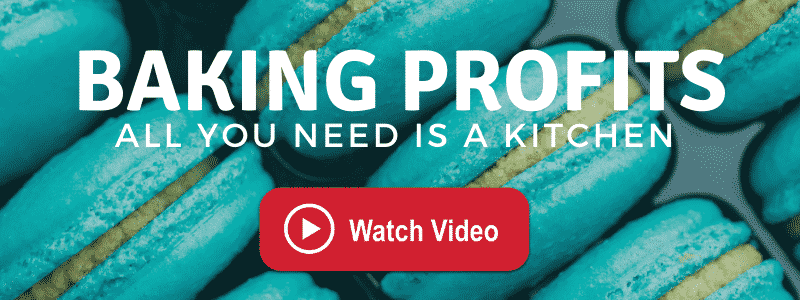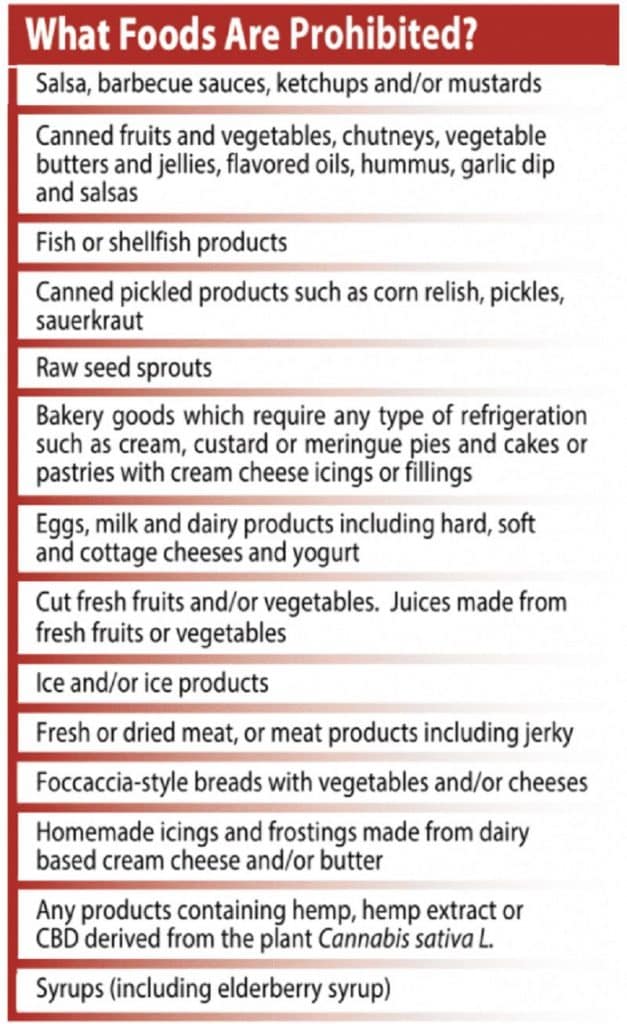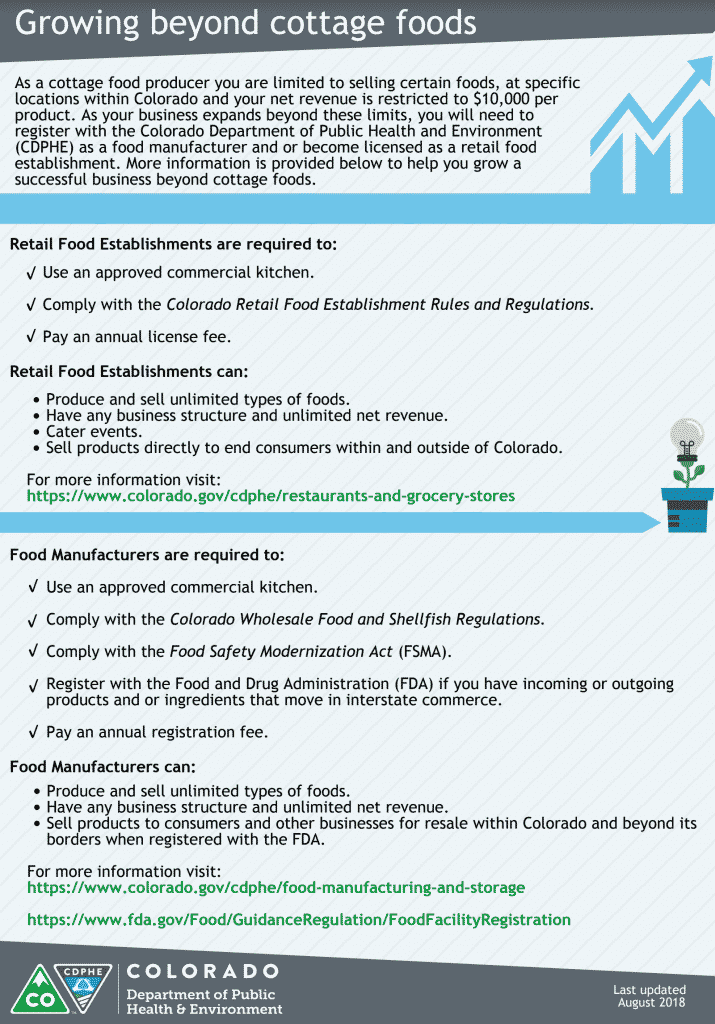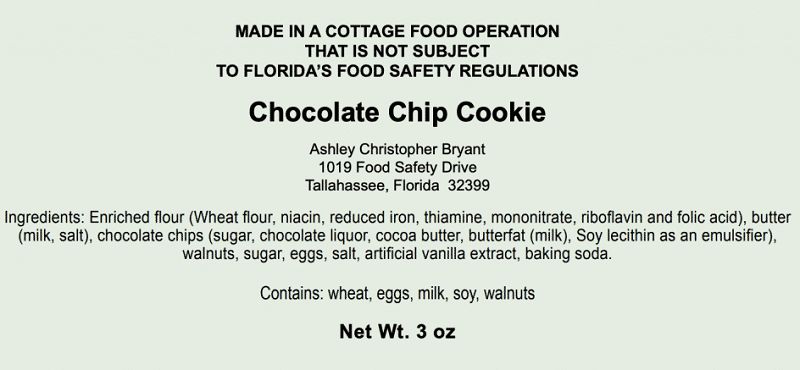Georgia Cottage Food Law got a major update (HB 398) and the new rules make it one of the best places to start a cottage food business.
Effective July 1, 2025:
- NO FEE: No licensing, renewal, or registration fee will be collected by the GDA.
- NO LICENSE: No license will be required or issued by the Georgia Department of Agriculture (GDA).
- NO PERSONAL ADDRESS ON PRODUCTS: In lieu of the current address labeling requirements, you may register with GDA for an identifier to be placed on your product labels.
- NO INSPECTION FOR LICENSE: Licensing inspections will no longer be conducted by the GDA. Inspections of consumer complaints and illness investigations may be conducted.
Table of Contents
HOW TO START YOUR COTTAGE FOOD BUSINESS IN GEORGIA

- The first step is to contact your city/county PLANNING & ZONING office(s) to make sure there are no local ordinances that prevent you from legally operating a home-based business.
- If you’re on well water (private well) – you will need to have your water tested by the Georgia Department of Agriculture first. Once your well water is proven acceptable you can move on to the next step.
Contact your county Ag. Extension office for well water testing: Georgia County Ag Office List or you can contact your local county health department. - The next step is to obtain FOOD SAFETY TRAINING that is American National Standards Institute (ANSI) accredited. There are three accreditations certified by ANSI: ServSafe™, NRFSP, and Prometric. A copy of the certificate from completing one of these food safety exams must be included when submitting a cottage food license application. Note: some of these providers call it a food handlers and not food safety.
GEORGIA COTTAGE FOOD LAW – Foods That Are Allowed
Georgia, like most states restrict foods that are temperature controlled and are potentially hazardous.
The following is a partial list of foods that allowed to be made in a Georgia cottage kitchen:
- Loaf breads, rolls, biscuits
- Cakes, pastries and cookies
- Candies and confections
- Honey (special conditions for honey producers here)
- Jams, jellies and preserves
- Fruit pies and dried fruits
- Dry herbs, seasonings and mixtures
- Homemade pasta
- Cereals, trail mixes and granola
- Coated or uncoated nuts
- Vinegar and flavored vinegars
- Popcorn and popcorn balls
Real Life Cottage Food Entrepreneurs and Opportunities
- Cakes – teacher turns kitchen into bakery
- Doughnuts – cottage mini donut vendor
- Fruit jams and jellies – See Additional Requirements Here
- Kettle corn – real kettle corn vendors from home
- Popcorn (plain and flavored) – see a real home vendor here
- Talk and Join hundreds of others here: VendorsUnited.com
GEORGIA COTTAGE FOOD LAWS – PROHIBITED FOODS
Georgia doesn’t really maintain a list of unauthorized or prohibited foods. The list of prohibited foods below is common for most states:

NOTE: Although eggs, milk and dairy products are not allowed, they may be used as ingredients for the allowed foods. Many prohibited foods that are baked or cooked into the allowed foods are rendered harmless and therefore allowed.
HOW MUCH ARE YOU ALLOWED TO MAKE WITH COTTAGE FOODS IN GEORGIA?
Georgia does NOT have any limits on the gross sales your cottage business can make before having to open a commercial or retail establishment.
Colorado created a brochure on going beyond cottage food once you’ve outgrown or hit your maximum allowed income.

ACIDITY LEVELS AND TESTING
Most states determine if a food is non-potentially hazardous by the acidity level found in the food. The higher the acidity, the more stable at a range of temps, that food product is.
For example: milk is low acidity and requires temperature controls.
The acidity of foods is measured by pH.
• The range of pH is commonly considered to extend from zero to 14. A pH value of 7 is neutral because pure water has a pH value of exactly 7. Values less than 7 are considered acidic, while those greater than 7 are considered basic or alkaline.
• All fruits are acidic foods and are usually tart and sour. Ex: tomato, lemon, peach, apple, etc.
• The FDA rule for acidic foods states that a food must have a pH below 4.6 to be sold as a minimally processed food.
• The reason for this is bacteria does not grow at this level of acidity.
• The exclusion shall not be construed as allowing the sale of low acid foods (pH > 4.6) in
hermetically sealed containers (i.e. home-canned green beans, peas, etc.) when such food is not prepared in a permitted establishment.
TESTING
Some states require testing if the pH level is unknown. For many food products, the pH level is already known.
You can test for pH yourself using a pH spear tester. (make sure it is made for food and has a long spear tip).
Oklahoma State University shares an awesome guide for selecting the correct tester for foods and liquids which includes tips and tricks for operation and maintenance. Get The Guide Here.
GEORGIA COTTAGE FOOD LAWS LABELING REQUIREMENTS
Most states require labeling on any product produced at a home kitchen. However, even if your state doesn’t require labeling, this is your chance to stand out and show you care.
GEORGIA cottage food laws require labeling on all products made under the cottage food law.
- Name of the cottage food product
- Ingredients of the cottage food product in descending order or amount of each ingredient by weight
- Net weight or net volume of the cottage food product
- If a nutritional claim is made, you must meet the FDA’s rules on nutrition labeling.
- A statement printed in 10-point font or larger type in a color that provides clear contrast to the background of the label that reads:
MADE IN A HOME KITCHEN THAT IS NOT SUBJECT TO STATE FOOD SAFETY INSPECTIONS
Below is an example of what the state of Florida requires on their labels. The same is required for Georgia.
Using VistaPrint.com or similar – you can quickly create professional labels that not only serve to meet the state cottage food guidelines but also serve for marketing your awesome business and products.
You’ll find some fantastic examples of this from members inside VendorsUnited.com

ALLERGENS ON LABELING
The FDA lists nine (9) major food allergens. Listing any of these on your label is a smart business practice and will certainly help your customers choose a product.
- Milk
- Eggs
- Fish (e.g., bass, flounder, cod)
- Crustacean shellfish (e.g., crab, lobster, shrimp)
- Tree nuts (e.g., almonds, walnuts, pecans)
- Peanuts
- Wheat
- Soybeans
- Sesame seeds
Simply add to your label: “NOTICE: SOYBEANS USED IN THIS RECIPE” Some go as far to announce that a certain allergen is used in the same kitchen.
Some states require you list any potential allergens and potential for any cross contamination even if the allergen is not used in the recipe.
FDA Allergen Labeling Example: Contains Wheat, Milk, Egg, and Soy
WHERE CAN I SELL MY COTTAGE FOOD PRODUCTS
GEORGIA COTTAGE FOOD LAWS – WHERE YOU CAN SELL
You may sell your cottage food products from your residence directly to the consumer. Sales are also approved at farmers’ markets, flea markets and even consignment tables inside a market.
Can I sell my Cottage Foods over the Internet?
Yes.
Can I sell my Cottage Foods to a wholesaler, broker or distributor?
Prior to HB 398, cottage food operators could only sell products directly to consumers. Now, cottage food operators may also sell their products to retail
food sales establishments like grocery stores, restaurants, and convenience stores.
Can I serve free samples of my Cottage Food Products?
Yes. As long as your product meets the requirements of the Cottage Food Regulations and is a non-potentially hazardous food, sampling is allowed.
Although you do not need an individual label for each sample, you must have properly labeled packages of your product on display with the samples so your customer can review the ingredient list.
Your Cottage Food Product cannot be cooked, handled, modified, or prepared in a way that makes it a potentially hazardous food (time/temperature control for safety food).
For example, if you baked French or Italian loaf bread you cannot add ingredients transforming your bread into a bruschetta for the purposes of sampling the bread.
Inside kitchenincome.com you can find out how many cottage food entrepreneurs are getting sales faster than they can make the food.
FOOD HANDLER TRAINING AND BEST PRACTICES
Georgia requires you obtain FOOD SAFETY TRAINING that is American National Standards Institute (ANSI) accredited.
There are many online courses accredited by ANSI: ANSI accredited food safety and handling courses. A copy of the certificate from completing one of these food safety exams must be included when submitting a cottage food license application.
Note: some of these providers call it a food handlers and not food safety.
SAFE PRACTICES
Much of this may seem like common sense, but even if you already know, it’s a good idea to remind yourself with a list of things that can prevent you from missing something small.
And if for no other reason… CYA! CYA = Cover Your A#%
CLEAN WORK AREA / WORK SPACE / SANITIZATION
Providing safe to eat foods from your kitchen – starts in your kitchen.
Keep your area clean and sanitized to avoid cross contamination and to insure you provide your customers and clients with the safest and best foods they can get.
The following are some “common” sense things you can do to insure the best environment for preparing foods to sell:
- Keep all equipment and surface areas clean and sanitized
- Make sure window and door screens are bug proof with no gaps
- Keep ingredients separate to prevent cross contamination / e.g. raw eggs near flour
- No pets in work area and preferably none in the home
- Allow no-one with a cold, sniffles or sick in kitchen while preparing foods
- Wipe down walls and clean floors daily
- Use good lighting to avoid missing unclean areas
- Keep window and door screens in good repair to keep insects out
- Wash hands frequently while working and use food grade gloves for extra safety
- Keep areas of food storage and equipment storage clean and sanitized
RECORD KEEPING
Why keep these types of records?
Let’s say the inspector calls you and says they got a report that your banana bread, someone purchased, made them sick.
You’ll be able to show that you didn’t even make banana bread that week and that the person who reported you, bought that 4 weeks ago and you weren’t even the one that sold it to him.
This does not need to be complicated. I love my yellow legal pads and they make an inexpensive tool for keeping up with the following:
- The recipes you use including ingredients
- The process you use to prepare that specific recipe: (can be just like recipe instructions)
- Date made (can be coded for your own use only if your state doesn’t require the production date) e.g. Made 12.22.29 = 292212
- Date sold (you can have a batch code to help track a certain batch) Simply write down date you sold an item
- Location sold is another great piece of information to keep track of
- Sales receipts are something great to keep for a couple of reasons and over at KitchenIncome.com I dive into the best practices, best systems and best methods for tracking, managing, selling and shipping.
COTTAGE FOOD LIABILITY INSURANCE
We live in a society that likes to sue. I can sue you for wearing that color shirt. No kidding! Of course I probably won’t win, but at the very least, it’s gonna cause you stress and some costs.
Liability insurance is a MUST.
It can be expensive – but several years ago, I found FLIP and by far, they gave me the most protection (coverage) and allow you to run your cottage food business without fear of being sued.
WHY? Because they provide the lawyers. And their lawyers… they are good!
Of course you should price shop around with your local agent or a national brand company, but rest assured, I’ve done all the legwork for you.
Alternatively, some folks opt to get bonded. You’ve heard the saying before: “licensed and bonded”. A bond is usually provided from an insurance bonding company or your own insurance company.
My first time, I got a bond at State Farm.
A bond is expensive comparatively but is less out of pocket in the beginning. Of course, it’s way, way less insurance / coverage too.
A $10,000 bond may cost $50 annually while a $2,000,000.00 liability policy may cost a few hundred a year.
No matter what you decide… knowing you’re insured against frivolous lawsuits is worth every penny.
GEORGIA COTTAGE FOOD LAWS QUESTIONS AND ANSWERS
Georgia’s list of common questions with answers about Cottage Food Operations and Licensing
GEORGIA COTTAGE FOOD LAWS IMPORTANT LINKS
- Georgia Cottage Food Laws – Operations
- Georgia PDF Brochure – Starting A Cottage Food Business
- Georgia Video On Starting A Cottage Food Business (some outdated info)
- Georgia Cottage Food Program Outline and Links
- Georgia Cottage Food Laws – Frequently Asked Questions
- Special requirements for Georgia honey producers
- Georgia Statutes / Cottage Food Regulations
- Georgia Cottage Food Safety Directives
- Georgia Cottage Food Application
CONTACT GEORGIA DEPARTMENT OF DEPARTMENT OF FOOD SAFETY – COTTAGE FOOD
Food Safety Division
19 Martin Luther King Jr Dr SW
Room 306
Atlanta, GA 30334
Food Safety Division: 404-656-3627
Licensing Division: 404-586-1411
UPDATES TO GEORGIA COTTAGE FOOD LAWS
From time to time, links, info, rules and numbers change, are updated or made obsolete.
Although I spend time daily with hundreds of vendors (many of which are cottage food businesses) – I can miss an update.
If you find a broken link or outdated state information… please let me know and I’ll send you a special thank you for helping me maintain the best site on the internet for the cottage food industry.
My goal has always been to have a central place that is absolutely free for those starting out or existing entrepreneurs who use their homes and kitchens to make real incomes.
Please send to [email protected] / or post inside the private VendorsUnited.com group.
Need more resources? Check it out HERE (Helpful Resources)
Take a peek at the best vendors on the planet, the community that rocks the food vending world: Vendors United…

Disclaimer
This information is provided to help those interested in starting a cottage food business. It is not a document made by the state government. This information is not provided as law nor should be construed as law. Always use the contact information for each state to confirm compliance and any changes.
Did we help you? Help us to share this information…
 WATCH VIDEO!
WATCH VIDEO! WATCH VIDEO!
WATCH VIDEO!
Do you need a cottage licence in Ga. To sell lemonade ?
Thanks so much for sharing this most helpful information!